Parts of the current Premier League table look unusual and, if I am honest, pleasingly so.
Nottingham Forest are in a Champions League position having spent most of the Premier League era on the outside looking in.
By a strange quirk, the four teams with the smallest average crowds – Bournemouth, Brentford, Crystal Palace and Fulham – are all above the three teams with the largest; Manchester United, West Ham and Tottenham.
It may not last. Come the end of the season, I’d expect heavyweights Liverpool, Manchester City, Arsenal and Chelsea to make up the top four and the trophies to be shared out between the normal suspects.
But even though I’ve been brought up to understand sport is about winning and losing, it’s brilliant to see the underdogs have their day. In part because a competitive league is a great thing for the ultimate wellbeing of the Premier League, even if the product is primarily sold around the world by those clubs regarded as the ‘Big Six’.
While advertisers and broadcasters aren’t placing their investments to screen matches like Fulham vs. Brentford globally, you do want the outliers to challenge the orthodoxy.
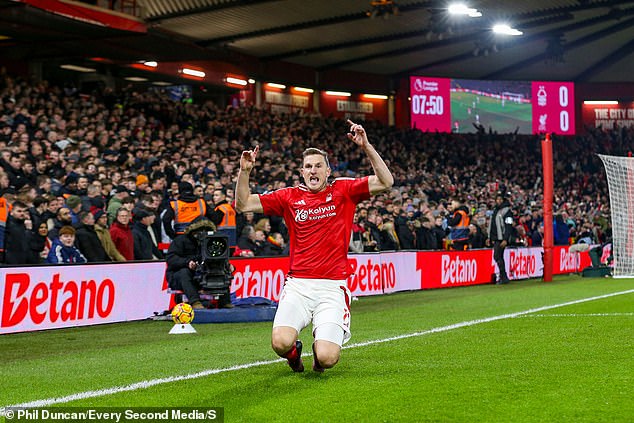
Nottingham Forest have been the surprise success story of the season as they sit third
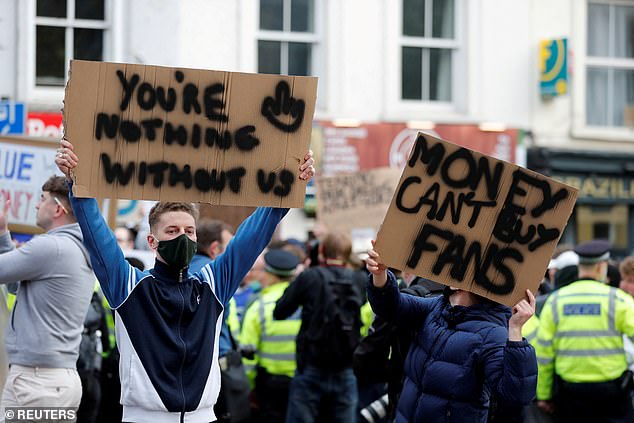
The first attempt at a European Super League was quickly shut down by a fan backlash
It’s brilliant for fans of those less traditional clubs, and we can also add Brighton into that list, to see them thrive by proper organisation, innovative recruitment policies and excellent managers. Notably, Bournemouth and Fulham are both owned by Americans and have Iberian coaches. They’re not short of a bob or two either. It’s been a very good formula for them.
While I loathe the idea of an independent regulator, there is an element of the footballing pyramid needing to be protected in some way so that clubs like Brentford and Brighton, who languished for years in the lower reaches of the Football League, can potentially find a pathway upwards to enrich the football landscape of this country.
The next challenge is allowing their stories and similar to continue happening when the European Super League comes because I believe that is an inevitability. A case of when, not if.
The more governance we have in football to restrict investment, the greater the requirement to generate revenue. If you’re suppressing the transfer market – the lifeblood of some clubs – via profit and sustainability rules (PSR) and rejecting wage caps through union pressure, you need to find another way of controlling the biggest driver in sport: the cost of talent.
People will hate the Super League to begin with, then get used to it, then accept and eventually enjoy it. But the pyramid has to remain in some form.
If you listen to Andrea Agnelli, the former chairman of Juventus and a champion of the Super League, it will now include promotion and relegation – i.e. meritocracy.
In truth, that was really the main issue with the 2021 proposal, and we must hope we can take him at his word so that the lesser lights at least have a puncher’s chance of mixing it with the elite.
When this season’s shake-up ends after 38 games, you’d still expect the clubs with the biggest budgets to come out on top but there are a raft of reasons why the table looks like it does now.
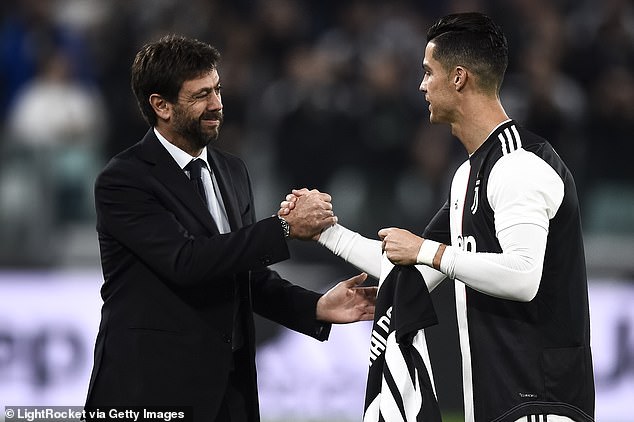
Andrea Agnelli (left) is talking up the prospect of bringing relegation into the Super League
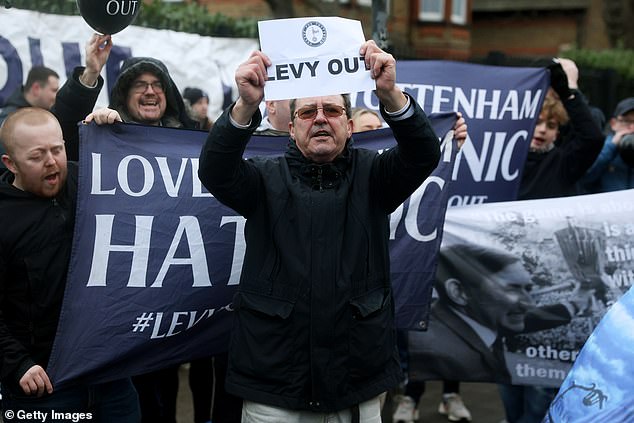
Tottenham fans believe that chairman Daniel Levy and owners ENIC are holding them back
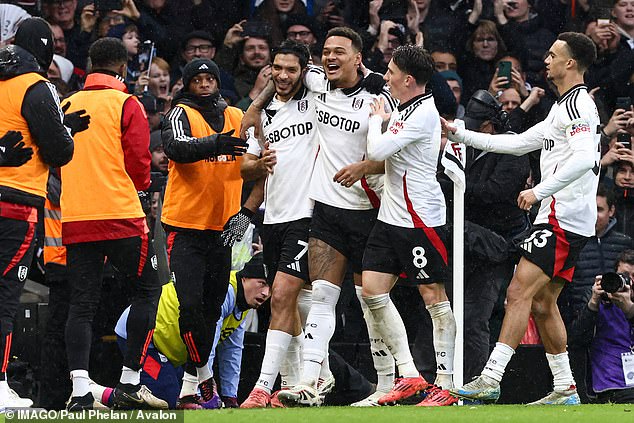
Fulham are on the rise – but their fans must remember what has been achieved
The percentage of a club’s turnover from ticket revenue is now only between about 10 or 20 per cent, so smaller clubs who also receive large dollops of broadcast revenue are able to compete if they spend it wisely.
There is also a sense that big clubs can become complacent about their huge revenues and therefore profligate in their spending. Manchester United have spent inordinate amounts of money badly, such as buying Antony for £80million when he’s not worth that valuation.
The smaller clubs with an element of needs must appear more focused and disciplined in their structure. If run properly, they can shrewdly uncover talent from all around the world – as Brighton in particular have received praise for – or in Crystal Palace’s case closer to home in the south of England, where they propelled the careers of Michael Olise and Eberechi Eze.
Lower expectations can also help. We are talking about Forest’s success precisely because we are stunned by it – not because we expected it. Meanwhile, the burden can weigh heavily on so-called big clubs, whose owners are unloved by supporters and have to deal with PSR.
West Ham fans think David Sullivan, who got a stadium for nothing, does things in an awful way without style, his managers delivering a style of football they hate.
The perception among Tottenham supporters is that Daniel Levy has built a wonderful cathedral of a stadium but presides over teams that win nothing, living with the demeaning moniker of being Spursy.
United fans will say the Glazers use their club as a cashpoint and neglected the stadium to such an extent they have water coming through the ceiling.
For the fans of Fulham, Bournemouth and the rest, this is a time to enjoy and celebrate. And also to remember it, because we all know the game has a very short memory.
If results turn, the mood turns – that is both the beauty and tragedy of our game. But if they are tempted in a year’s time to shout at the board to spend more money or get rid of the manager, don’t forget what has been achieved!
And also bear in mind that if you ever were to become a so-called bigger club, when you replace the establishment, you often become the establishment.
WHY HAALAND’S MEGADEAL SHOULD BE A WARNING FOR THE FUTURE
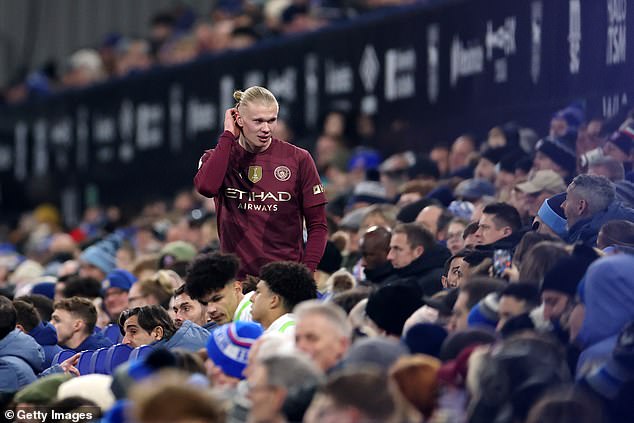
Erling Haaland is head and shoulders above the rest – but there is reason to be cautious
Erling Haaland will now be earning £500,000 a week for the next nine-and-half years.
When you take into account national insurance contributions, Manchester City will be spending as much on one player’s contract as the Saudi PIF consortium, the world’s richest owners, paid to buy the whole of Newcastle United.
Salaries for the top players won’t stop now. Of course we’ll get a million-pound-a-week footballer at some point. What is going to stop it? Tom Cruise has been paid £70million for a single movie before now. Football is also now an entertainment business so the talent will be paid appropriately.
One word of warning about the future, however. We have to be so bloody careful with ‘innovations’ like VAR and PSR not to attack the very fabric of what has made the game successful, that entertainment aspect.
If you stop the rhythm, flow, investment and competition which makes football the world’s game, what is left?
Author :
Publish date : 2025-01-22 08:00:00
Copyright for syndicated content belongs to the linked Source.
The post SIMON JORDAN: The European Super League is inevitable. Here’s who should be in it this time first appeared on Love Europe.
—-
Author : love-europe
Publish date : 2025-01-22 19:18:23
Copyright for syndicated content belongs to the linked Source.